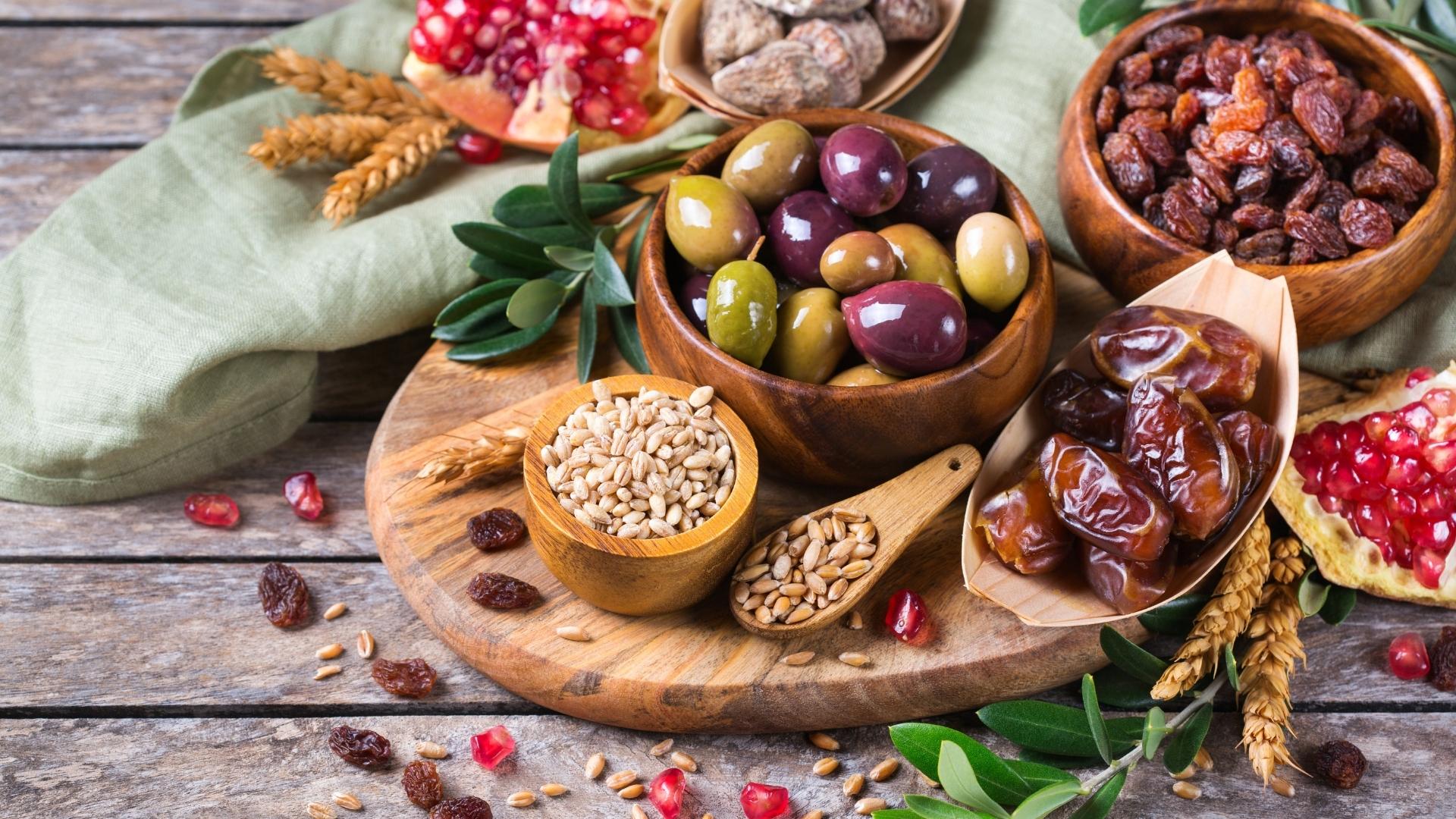When the Israelites are preparing to enter the land of Israel for the first time, we read:
“For Adonai your G-d is bringing you into a good land, a land with streams and springs and fountains issuing from plain and hill; a land of wheat and barley, of [grape]vines, figs, and pomegranates, a land of olive trees and [date] honey; a land where you may eat food without stint, where you will lack nothing.”
—Deuteronomy 8:7-9
These seven plants—wheat, barley, grapes, figs, pomegranates, olives, and dates—are known as the shivat haminim, the seven species. As symbols of the abundance and fertility of the land, they also serve as a great reminder of some solid nutritional advice: eating lots of fresh, varied plant foods to get all the nutrients the human body needs.
Let’s take a look at what each of these plant-based powerhouses provides:
Wheat
Whole grains are one of the most important staples of any diet. An essential source of dietary fiber, they keep blood sugar levels steady and can help reduce risk of or mitigate complications from type 2 diabetes. Whole wheat also contains a substantial quantity of iron, with 120g (1 cup) of flour providing 24% of the recommended daily value of this critical nutrient. And it may surprise you to learn how much protein there is in whole wheat: That same 120g has a full 16g of protein—just about a third of the recommended daily value.
Barley
Like wheat, hulled barley is packed full of dietary fiber, protein, iron, and B vitamins. You’ll also find an incredible quantity of minerals: 184g (1 cup) provides high amounts of manganese, phosphorus, selenium, copper, and zinc.
Grapes
Grapes are an important source of Vitamins C and K, and they’re also relatively high-fiber. One of the best things about grapes, though, is that they are very high in antioxidants, which lower cancer risk and can help lower cholesterol.
Grapes are also antimicrobial, anti-inflammatory, and generally excellent at reducing hypertension and associated risk of cardiovascular disease. And yes, these benefits do carry over—and are sometimes even intensified—in wine, especially red wine (you can find vegan wines, including kosher ones, here). There’s a good reason we make special blessings over the fruit of the vine!
Figs
Figs are surprisingly rich in calcium, along with fiber, potassium, B vitamins, and Vitamin K. This makes them ideal for supporting bone health and lessens risk for osteoporosis.
Pomegranates
Like grapes, pomegranates are high in polyphenols, meaning they have significant antioxidant properties. They are also especially high in potassium, Vitamin K, and Vitamin B9 (folate). For a fruit, they have a noteworthy amount of protein and iron, and an 8-ounce serving of pomegranate juice will provide 5% of the recommended daily value of Vitamin E, Vitamin B6, and pantothenic acid.
Olives
Olives are an excellent source of iron, with 135g (1 cup) providing a full 47% of the recommended daily value. They also have a high amount of calcium and Vitamin E. While olive oil, like all oils, is a saturated fat and should be used sparingly, it does compare favorably with other sources of saturated fats, especially animal-based ones. This is due to its high levels of monounsaturated fats (also found in unprocessed olives), which can help with inflammation and cholesterol levels and improve heart health.
Dates
Dates have a ton of fiber and potassium, and like pomegranates are surprisingly high in protein and iron. They also have a good amount of calcium, B vitamins, and Vitamin K. And there’s an added benefit to dates: They have strong antibacterial properties, including against salmonella and E. coli.
And you may have noticed that the Torah quote refers to date honey. In the Bible, references to honey typically mean a syrup made from dates, not bee honey. Date syrup, in addition to retaining high fiber and vitamin content as compared to other sweeteners, has also been shown to have significant anti-inflammatory benefits.
On their own, each of the seven species is full of nutritional benefits. But when we put two or more of them together, they can provide a fuller range of vitamins, minerals, and nutrients with which we can truly eat and be satisfied.
The same principle holds true for us now, just as it did in our ancestors’ time: When we eat lots of different plant-based foods, we ensure that our bodies are getting all of the nutrients they need for us to thrive.
